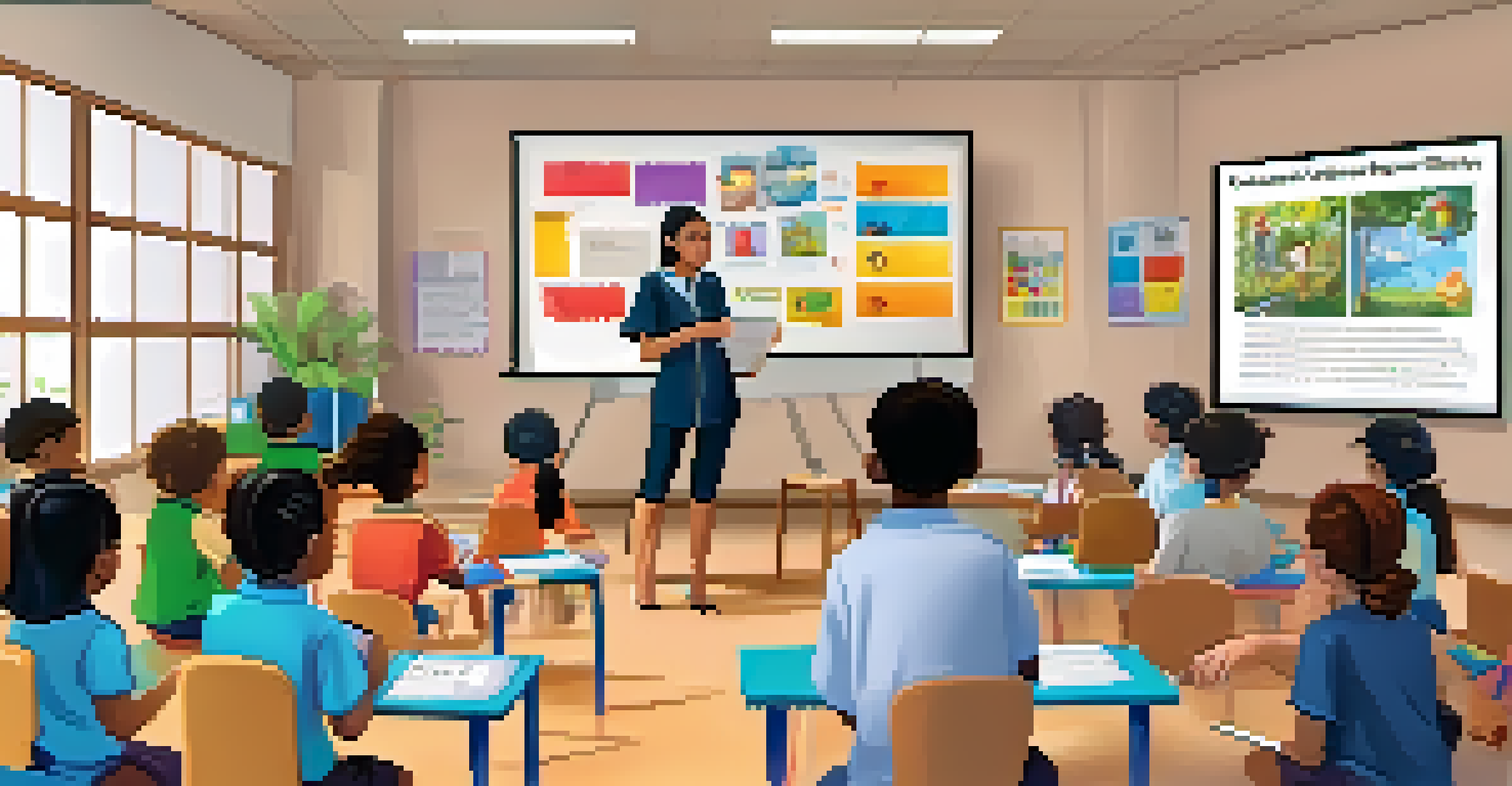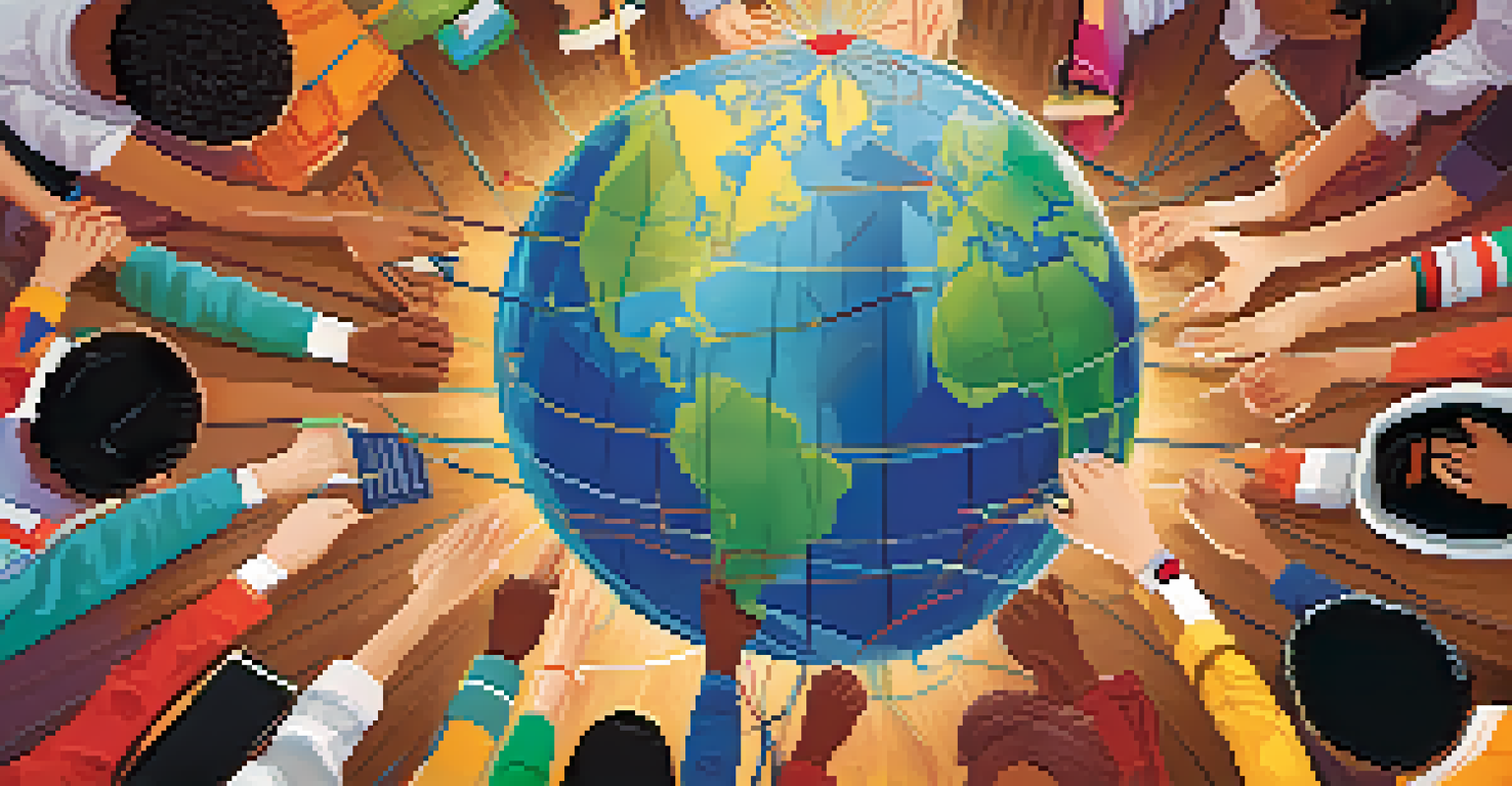Global Education and the Challenge of Disinformation

Understanding the Nature of Disinformation
Disinformation refers to false information that is intentionally spread to deceive. In today’s digital age, it proliferates rapidly, often outpacing fact-checking efforts and leaving a wake of confusion. This creates an environment where misinformation can easily masquerade as truth, posing significant challenges to learners worldwide.
In a time of deceit telling the truth is a revolutionary act.
The spread of disinformation is not simply a nuisance; it can lead to profound misunderstandings about critical issues like health, politics, and climate change. For instance, during the COVID-19 pandemic, false narratives about the virus and vaccines circulated widely, complicating public health responses. Understanding the nature of disinformation is crucial for developing effective educational strategies to combat it.
To navigate this complex landscape, individuals must develop critical thinking skills that enable them to discern reliable information from dubious sources. As global citizens, we are tasked with not only seeking the truth but also sharing it responsibly. Education systems need to adapt and incorporate these skills into their curricula to prepare students for this challenge.
The Role of Education in Combating Disinformation
Education serves as a powerful tool against disinformation by equipping individuals with the skills needed to critically assess information. Schools and universities can play a pivotal role by integrating media literacy into their programs, teaching students how to evaluate sources and recognize biases. This proactive approach can significantly mitigate the spread of false narratives.

Furthermore, educators can foster environments where questioning and discussion are encouraged. By promoting open dialogue about various topics, students can learn to challenge misinformation collaboratively. This not only enhances their understanding but also cultivates a sense of responsibility toward sharing accurate information.
Disinformation Challenges Education
Disinformation poses significant challenges for global education systems, requiring a focus on media literacy to equip students with critical thinking skills.
As such, global education systems must reevaluate their curricula to prioritize media literacy, ensuring that students graduate with the necessary tools to navigate an increasingly complex information landscape. By doing so, we empower the next generation to become informed citizens who can contribute positively to society.
Challenges Faced by Global Education Systems
Global education systems face numerous challenges in addressing disinformation, particularly in areas with limited resources. Many schools lack access to technology and training, hindering their ability to teach media literacy effectively. This digital divide exacerbates the problem, leaving vulnerable populations susceptible to misinformation.
The greatest weapon against stress is our ability to choose one thought over another.
Additionally, cultural factors can influence how disinformation is perceived and addressed in different regions. In some communities, traditional beliefs might clash with scientific information, complicating efforts to promote accurate knowledge. Educators must navigate these cultural nuances to effectively teach students how to identify and combat false information.
Moreover, the rapid evolution of digital media means that educators must continuously update their approaches. Staying informed about the latest trends in disinformation is essential, yet it can be overwhelming for educators already stretched thin. Collaborative efforts among educators, policymakers, and tech companies are vital to overcoming these challenges.
The Impact of Social Media on Disinformation
Social media platforms have revolutionized the way information is shared, but they also serve as breeding grounds for disinformation. With millions of users sharing content daily, false narratives can gain traction quickly, often outpacing fact-checking efforts. This phenomenon poses a significant challenge for educators trying to instill critical thinking in students.
In many cases, sensationalism leads to virality, overshadowing factual reporting. For instance, a misleading headline may spread more rapidly than a well-researched article, influencing public perception and understanding. Educators must teach students how to critically evaluate what they encounter online, fostering skepticism toward sensational claims.
Social Media's Role in Misinformation
Social media platforms accelerate the spread of disinformation, making it essential for educators to teach students how to critically evaluate online content.
To address this issue, social media companies have a role to play in curbing the spread of disinformation. Implementing stricter guidelines and promoting credible sources can help create a healthier information ecosystem. By working together, educators and social media platforms can empower individuals to sift through the noise and find reliable information.
Promoting Global Collaboration in Education
The fight against disinformation requires a collaborative approach that transcends borders. Educational institutions worldwide can share resources and strategies to combat misinformation effectively. By fostering international partnerships, educators can learn from one another and adapt successful methods to their local contexts.
Global collaboration can also enhance cultural understanding, allowing students to appreciate diverse perspectives. When students engage with peers from different countries, they can better understand how disinformation impacts various communities. This exchange of ideas enriches the educational experience and prepares students to tackle global challenges.
Moreover, technology plays a crucial role in facilitating these collaborations. Online platforms can connect educators and students, enabling them to share knowledge and resources regardless of geographical barriers. By leveraging technology, we can create a united front against disinformation and promote a more informed global citizenry.
Innovative Strategies to Teach Media Literacy
As the landscape of information continues to evolve, innovative strategies for teaching media literacy are essential. Educators can utilize interactive tools and gamification to engage students in the learning process. For instance, simulation games that challenge students to identify credible sources can enhance their critical thinking skills in a fun, relatable way.
Incorporating real-world examples and case studies can also make learning more relevant. By analyzing current events and discussing the role of disinformation, students can see the practical implications of their skills. This connection to real-world situations helps reinforce the importance of media literacy in their daily lives.
Empowering Students as Truth Advocates
Education aims to empower students to become responsible information stewards, promoting ethical sharing and critical dialogue to combat misinformation.
Additionally, encouraging students to create their own content can foster a deeper understanding of information dissemination. By producing blogs, podcasts, or videos, they can practice evaluating sources and presenting facts responsibly. This hands-on approach not only builds skills but also empowers students to become advocates for truth in their communities.
Empowering Students as Information Stewards
Ultimately, the goal of education in the face of disinformation is to empower students to become information stewards. This means equipping them not only with the skills to discern truth from falsehood but also instilling a sense of responsibility toward sharing accurate information. When students recognize the impact of their digital footprints, they are more likely to approach information sharing thoughtfully.
Moreover, fostering a culture of accountability encourages students to engage in respectful discussions and challenge misinformation. By promoting critical dialogue, we can create environments where diverse opinions are valued, and truth prevails. This not only strengthens individual understanding but also enhances community resilience against disinformation.

As we educate the next generation, we must emphasize the importance of ethical information sharing. By nurturing informed citizens who are committed to truth, we can collectively combat the challenges posed by disinformation and build a more knowledgeable and responsible society.